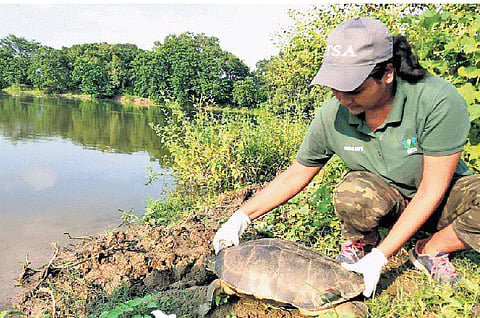

UTTAR PRADESH : The Gomti that flows through her hometown Lucknow has always fascinated her since childhood. Its murky banks, still depths, and quiet cadence filled little Arunima with a sense of intrigue. She couldn’t help but wonder of the teeming wildlife that wandered in those waters. Her frequent visits to the river bank culminated in a trip to Kukrail’s turtle conservation centre in Lucknow as part of her MSc dissertation in 2010.
Arunima Singh, now 39, was affected so deeply by her visit to the turtle conservation, that she turned into a devout champion for aquatic wildlife, saving the lives of over 35,000 turtles and other marine animals in 11 years. She has also trained over 50,000 children in the conservation of marine wildlife and reptiles.
In October 2021, Arunima received the NatWest Group Earth Heroes: Save the Species Award 2021 for her outstanding conservation mission protecting North Indian freshwater turtles, tortoises, crocodiles, and Gangetic river dolphins.
“Arunima’s work is at the grassroot level, building capabilities of local communities at vulnerable regions. The jury of the 11th edition of the Earth Heroes awards was impressed by her dedication and science-based approach resulting in good outcomes on the ground,” says N Sunil Kumar of NatWest India Foundation.
While Arunima was interested in marine life since childhood, the turn-around came when she met Dr Shailendra Singh, the erstwhile director of Turtle Surveillance Alliance (TSA) India in 2010.
“He encouraged me to work on turtles and suggested me to visit Kukrail Gharial and Turtle Rehabilitation Centre. My first visit hooked me to the endeavour. Then I started visiting the centre regularly as a volunteer and was hired full time as a research assistant in 2013,” Arunima says.
Working on a turtle conservation project gave her insights into the lives of these creatures, the roles of such rehabilitation centres and the numerous, covert threats faced by Tortoises and Freshwater Turtles (TFTs). “The general lack of awareness about comparatively ‘less charismatic’ wildlife drove me to work for their conservation,” she says.
While pursuing a PhD in turtle ecology, Arunima studied the dynamics of its population and reproductive aspects of the Crowned River Turtle (Hardella thurjii). Now, as an aquatic wildlife crusader, she is working extensively on various aspects of conservation – advocating urgent need for rehabilitation and breeding programmes for some of the severely threatened species; working towards rejuvenating turtle conservation-breeding programmes in UP; contributing to the forest department’s efforts in the development of assurance colonies; and spearheading programmes for 13 freshwater turtle and tortoise species of North India.
One of her significant contributions as a conservationist is development of assurance colonies for all Indian turtle species under one roof – a work she started as an intern with the TSA. Assurance colonies are a group of critically-endangered or threatened animals in captivity. These are protected under various conservation and breeding programmes to ensure that these creatures do not become extinct. In the wild, these animals have very low chances of survival, and they may only do so in an assurance colony.
Gaining trust and drawing engagement of communities, both at rural and urban levels, has been the most challenging endeavour. “While it was difficult to draw the interest of urban people who have severed their connection with nature, motivating rural and fishing communities to reduce their dependency on riverine resources was quite quailing. The relationship between reptiles and humans has never been very appealing and educating them on their coexistence and importance is difficult,” Arunima shares. “The recent exponential rise in illegal turtle trade is further posing challenges in the conservation efforts,” she laments.
She has developed assurance colonies for more than ten endangered and critically endangered species of freshwater turtles. When Arunima started working towards building these colonies, she also started getting calls from the enforcement agencies about endangered species of turtles which had been rescued or confiscated from smugglers. Earlier these rescued turtles would be simply release back into the wild as there were no centres to rehabilitate these cretures.
“The first consignment we helped rehabilitate was around 300 spotted pond turtles (Geoclemys hamiltonii) near Etawah and Mainpuri in 2015. We brought them to Kukrail and tended to them for at least 60 days before releasing them back into the wild. However, at the time, these turtles, particularly soft-shelled ones, suffered from high mortality because of the way in which they were scrappily transported by the poachers,” Arunima says.
Thereafter, there was a relentless flow of seized turtles into the conservation centre, a large number of them rescued with the help of UP Police’s Special Task Force, and other aquatic reptiles which her team would rehabilitate before releasing them in the Saryu or Chambal.
Once in 2017, police confiscated a record 6,400 turtles in Amethi and nabbed the kingpin of an inter-state gang involved in the smuggling. Arunima says it was an eye-opener in terms of understanding the scale of smuggling taking place and building a triage centre.
From then on, the TSA began offering training to personnel of the forest department, police, and local communities across the state where consignments of these turtles were confiscated on how to approach rescue and rehabilitation.